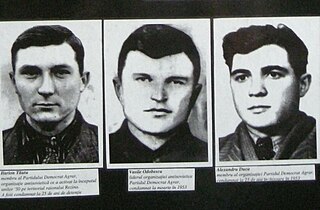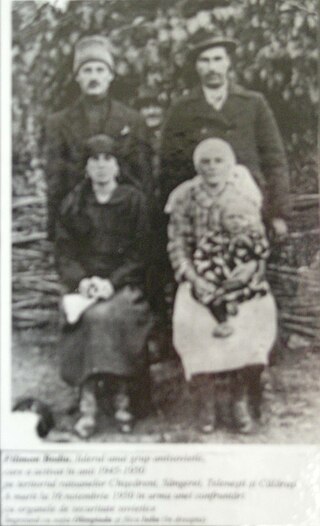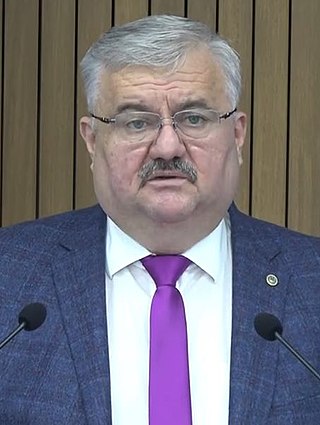Related Research Articles
During the Soviet occupation, the religious life in Bessarabia and Northern Bukovina underwent a persecution similar to the one in Russia between the two World Wars. In the first days of occupation, certain population groups welcomed the Soviet power and some of them joined the newly established Soviet nomenklatura, including NKVD, the Soviet political police. The latter has used these locals to find and arrest numerous priests. Other priests were arrested and interrogated by the Soviet NKVD itself, then deported to the interior of the USSR, and killed. Research on this subject is still at an early stage. As of 2007, the Christian Orthodox church has bestowed the martyrdom to circa 50 clergymen who died in the first year of Soviet occupation (1940–1941).

The Commission for the Study and Evaluation of the Communist Totalitarian Regime of the Republic of Moldova was a commission instituted in Moldova by Acting President of Moldova Mihai Ghimpu to investigate the Moldavian SSR, the state which administered the country as a Soviet Socialist Republic from 1940 to 1991, and provide a comprehensive report with the purpose of condemnation of Marxism-Leninism as experienced by Moldovan people.

The Democratic Agrarian Party was a clandestine political party in the Moldovan SSR.

The National Organization of Bessarabia "Arcașii lui Ștefan" was one of the organized anti-Soviet groups in Bessarabia right after World War II.
The Freedom Party was a clandestine political party in the Moldovan SSR.
Igor Cașu is a historian from the Republic of Moldova.

Filimon Bodiu was a Moldovan activist in the former Moldavian Soviet Socialist Republic.

Olimpiada Bodiu (1912–1971) was a Bessarabian activist and member of an anti-communist resistance group in the former Moldavian Soviet Socialist Republic.
Ion Varta is an academic and politician from the Republic of Moldova.
Demir Dragnev is a historian from the Republic of Moldova.

Andrei Eșanu is a historian, writer and researcher from the Republic of Moldova. He is a member of the Commission for the Study of the Communist Dictatorship in Moldova. He is part of the Academy of Sciences of Moldova, and was elected an honorary member of the Romanian Academy in 2011.
Pavel Parasca is a historian from the Republic of Moldova.
Anatol Petrencu is a politician, historian and academic from the Republic of Moldova. In 1990-1992 he was the dean of the Faculty of History of the State University of Moldova, and between 1998 and 2006 he was president of the Association of Historians of Moldova. Between 2006 and 2010 he was the president of the European Action Movement party. Since October 2010 he has been the director of the Institute of Social History "ProMemoria". Vice President of the Liberal Party.

Igor Șarov is a Moldovan professor, historian, editor and former politician who previously held the office of Minister of Education, Culture and Research in the Chicu Cabinet.

Octavian Țîcu is a Moldovan politician, historian, and former professional boxer serving as a Member of Parliament in Moldova since 2019. He was Ministry of Youth and Sport in 2013.
Sergiu Musteață is a historian from the Republic of Moldova and Dean of History and Geography Faculty, "Ion Creangă" State Pedagogical University.
Mihai Taşcă is a historian and jurist from the Republic of Moldova.
Vasile Bahnaru was a Moldovan philologist.

The Monument to the Victims of the Soviet Occupation is a proposed monument in Chișinău, Moldova.

Vasile Odobescu was a founder and leader of the anti-Soviet organization Democratic Agrarian Party.
References
- ↑ 165/14.01.2010 Decret privind constituirea Comisiei pentru studierea si aprecierea regimului comunist totalitar din Republica Moldova, Monitorul Oficial 5-7/3, 19.01.2010
